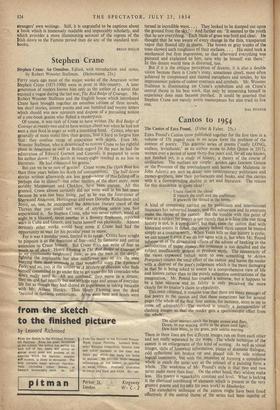Stephen Crane
Rwry years ago most of the major works of the American writer Stephen Crane (1871-1900) were in print in this country. A later generation of readers knows him only as the author of a novel that enjoyed a vogue during the last war, The Red Badge of Courage. Mr. Robert Wooster Stallman and the English house which introduced Crane have brought together an omnibus cdition of three novels, ten short stories, sixteen poems and one hundred and twenty letters which should win new admirers and dispose of a prevailing notion of a one-book genius who fluked a masterpiece. Of course, it was rash of Crane to have written The Red Badge of Courage at twenty-two and to have written about war when he had not seen a shot fired in anger or with a trembling hand. Critics, who are generally of more stolid fibre than genius, find it hard to forgive him that: they confuse range of experience with depth. Even Mr. Wooster Stallman, who is determined to restore Crane to his rightful place in American as well as British regard (in the past he had the admiration of Edward Garnett and Conrad), is prepared to write his author down: His death at twenty-eight resulted in no loss to literature. He had exhausted his genius.' But can we be so sure of genius? Crane wrote The Open Boat less than three years before his death (of consumption). The half dozen stories written afterwards are less good—some of this falling-off is perhaps due to illness?—but other masters of the short story, most notably Maupassant and Chekhov, have been uneven. All this granted, Crane almost certainly did not write well in his last years because he was too busy living: just as he was the forerunner of Sherwood Anderson, Hemingway and even Dorothy Richardson and Joyce, so, too, he anticipated the American literary creed of the Thirties that you could not write of anything unless you had experienced it. So Stephen Crane, who was never robust, stood all night in a blizzard, spent another in a Bowery flophouse, reported wars in Cuba and Greece, and burnt himself out physically. Almost certainly other works would have come if Crane had had the opportunity to wait for his peculiar yeast to move. For it was a peculiar yeast, limited in its range. Critics have sought to pinpoint it as the depiction of fear—and by fantastic and untrue extension to Crane himself. But Crane does not write of fear so much as of shock: Henry Fleming in The Red Badge of courage is In nn emotionally heightened state; so are the men in the dinghy fighting the. implacable but also indifferent sea; so are the men burying their dead.commeti in that wonderful story The upturned Face; and so, too, is the so dier in A Mystery of Heroism who finds himself committed to go under fire to get water for his comrades who dOret really need it. All are confused; they move in a dreaIn • , they see and feel intently but not with the eyes and senses of everyday life but as though they had shared an experiment in taking mescalin with Mr. Aldous Huxley. Thus Henry Fleming sees the dead 'twisted in fantastic contortions. Arms were bent and heads were turned in incredible ways.... They looked to be dumped out upon the ground from the sky.' And further on: 'It seemed to the youth that he saw everything. Each blade of grass was bold and clear. He thought that he was aware of every change in the thin, transparent vapor that floated idly in sheets. The brown or gray trunks of the trees showed each roughness of their surfaces.... His mind took a mechanical but firm impression, so that afterward everything was pictured and explained to him, save why he himself was there.' In this dream world time is distorted, too.
But if it is the oblique perception of dreams, it is also a double vision because there is Crane's irony, sometimes direct, more often achieved by compressed and slanted metaphors and similes, by his impressionist palette of colour contrasts and symbols. Mr. Wooster Stallman is illuminating on Crane's symbolism and on Crane's central theme in his best work, that only by immersing himself in experience does man become purified. It could be asserted that Stephen Crane not merely wrote masterpieces but also tried to live one.
DAL STIVENS


































 Previous page
Previous page